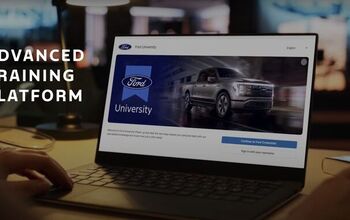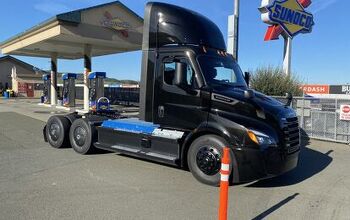Volkswagen Learns That Big Green Promises Are Really Expensive

Just a year ago, Volkswagen Group announced it wasn’t just going to build a series of standalone electric car models — it wanted an EV version of every model in its stable. The automaker may as well have tried buying the rights to the Green Giant mascot from B&G Foods, too.
A year later, former CEO Matthias Müller’s replacement is discovering that lofty promises don’t come cheap. The automaker’s goal is well out of reach, unless it starts making more money.
The plan was originally estimated to cost roughly $23 billion between 2017 and 2030, financed with the help of a streamlining push designed to wring maximum profits out of all of VW’s vehicles. Now, CEO Herbert Diess, who took over from Müller in April, claims that sum won’t be enough.
According to Bloomberg (via Automotive News), Diess told employees via the company’s internal newsletter that, “The burden for our company, such as the cost of bringing to market electric cars, will be higher than expected.”
He added, “This is particularly so since some of our competitors have been making more progress.”
While Diess won’t say what the actual sum might be, he’s not alone in facing greater-than-expected costs in greening his fleet. Mercedes-Benz recently upped the cost estimate for its planned line fo 10 all-electric models. Across its brands, VW Group plans 300 plug-in electric or hybrid vehicles by 2030.
It’s not as though the company isn’t making headway on the profitability front, however. The company’s VW brand saw profitability rise to 4.1 percent last year, up from 1.8 percent in the dismal, scandal-plagued year of 2016. Making peace (and a pact) with its powerful labor union helped a lot, but there’s more efficiencies to be found.
“We need higher profits to finance our future,” Diess said. “Four percent is a minimum, 5 percent to 6 percent allow for some future investments and with 7 percent to 8 percent we’re crisis-ready.” The automaker already stated its hopes to hit a company-wide operating profit of 8 percent of sales by 2025, with the VW brand reaching 6 percent. Currently, the company-wide figure stands at 7.4 percent.

More by Steph Willems
Latest Car Reviews
Read moreLatest Product Reviews
Read moreRecent Comments
- Bd2 The coolest true SUV on the market. Change my mind.
- VoGhost Fettle, racket, wade, throne -- what's going on with Matthew?
- Mcw I have only seen one on the road in Northern California, but I have to say I liked the appearance. Too bad.
- Bd2 I hope Elon eats one for dinner.
- Wjtinfwb I really like these, but can't shake the voice in my head that says, "$9000 will just be the starting point. You'll have 20 grand in this baby inside of 18 months".


































Comments
Join the conversation
sportyaccordy: Of course, there has already been an issue with gas stations running short, so the ICE advantage there is questionable.
There is no reason whatsoever for VW to release even a single EV model until technology has progressed to the point where an EV has a range at least as good as an ICE car, has a battery that may be fully charged with the same speed as filling a fuel tank, AND does not have a significant cost penalty over ICE cars in the showroom without taxpayer subsidies. The fact that VW is already guilty of releasing sub-par EVs that never should have seen the light of day, is scandalous enough as it is (not that it is alone in doing so, even an automaker such as Tesla, which specializes in EVs, has never released anything but shoddy products that constitute a waste of money, resources and attention). So the natural thing to happen here would be for Diess to retract all VW's plans to make EVs for the foreseeable future, and then pull all VW's existing EVs from the market at the same time. All other automakers should also immediately kill their EV lineups (including Tesla, of course), go back to the drawing board, and only release new EVs when they're able to create EVs that are competitive on the marketplace and deserve to exist. As these are modest and fair suggestions, there's no reason to think that anyone would have any significant objections (though I'm sure there may be some nutcases on TTAC that have the audacity to object nevertheless).